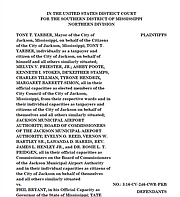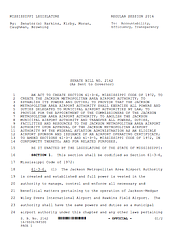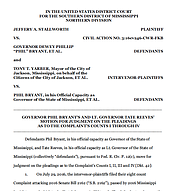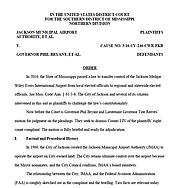Wednesday, August 9, 2017
Discovery in the lawsuit over the Jackson “airport takeover” legislation continues in U.S. District Court, despite Judge Carlton Reeves dismissing some of the counts this summer. Photo by Imani Khayyam.
JACKSON — The legal fight over who controls the Jackson airport continues outside the courtroom for now after U.S. District Judge Carlton Reeves dismissed three of the city of Jackson's initial claims this July.
Jackson City Council members, former Mayor Tony Yarber and members of the Jackson Municipal Airport Authority joined and now spearhead the legal claim, initially brought by Jeffrey Stallworth, who has since left the case. They are suing a long list of state elected officials who range from very involved to passively involved with passing the airport "takeover" bill in 2016.
The plaintiffs alleged that Senate Bill 2162 violated the Supremacy Clause of the U.S. Constitution.
"There is a total disregard of the fact that the City is the owner of all airport properties and the co-sponsor with the JMAA relative to the Airport Operating Certificate. Such an attempt to divest the City of its legal rights assured under federal law is in direct conflict with the FAA's authority to issue the Airport Operating Certificate for Jackson-Medgar Evers International," the amended complaint says.
The legislation transfers control of the airport, which is in Rankin County but sits on City of Jackson property, from the Jackson Municipal Airport Authority to a larger nine-member board made up of appointed officials from the city, Rankin and Madison counties, and mayoral, governor and lieutenant governor appointees.
The bill created a major rift between Democrats and Republicans in 2016, as Jackson lawmakers felt betrayed after a largely Republican Rankin County delegation of lawmakers used their GOP comrades to push the bill through.
The lawsuit halted any transfer or powers, however, and for now, JMAA still maintains control of the airport. The board is majority African American, appointed by the Jackson mayor.
In January, Gov. Phil Bryant and Lt. Gov. Tate Reeves asked Judge Reeves to dismiss the city's counts because they "contained no valid legal claim" against the governor or the lieutenant governor. On July 25, Reeves dismissed all but one of the four counts.
Judge Reeves said while the city's argument might factor into a future FAA decision, "it is not evidence of Congressional intent to preempt local and state control of airport governance."
The Legislature passed Senate Bill 2162 in April 2016, and Gov. Bryant signed it into law May 4. Two months later, the Federal Aviation Administration released a rule-change policy that dealt with airport governance. The policy reiterated that the FAA alone has the authority to determine sponsor eligibility of an airport, as well as approve a change in sponsor. The new policy also outlined how states should go about changing sponsors.
"Any state or local legislative body or public agency considering whether to take an action, such as drafting legislation, that would impact airport ownership, sponsorship, governance or operations should 1) consult with and obtain the consent of the current sponsor/operator ... and 2) request technical assistance from the FAA about the interrelationship between Federal and state or local requirements and seek the FAA's review and comment as early in the deliberative process as is practicable," it stated.
In the case of the Jackson airport, none of this happened. Instead, protests at the Capitol and a lot of long nights, particularly in the House of Representatives, engulfed the 2016 legislative session, which adjourned two months before this new policy came out.
The FAA policy also outlines how it will deal with disputed changes to airport sponsorship.
"The FAA expects that all disputes about whether to change airport sponsorship and/or operating authority will be resolved through a legally-binding agreement between the parties involved in the dispute or a final, non-reviewable legal decision," the policy states.
In other words, the FAA will not act on any change in governance, or even accept an application for a change in airport sponsorship (which would make SB 2162 really official) until a legal resolution is in place.
In his order, Judge Reeves dismissed the city's constitutional claims, but left open a due-process argument for down the road. While Reeves ruled that the City does not have due-process rights in its case to keep the airport, the individual citizens listed in the case might. The legal road ahead looks long and arduous.
Lawyers representing City officials have issued subpoenas for several lawmakers, and John Walker, an attorney representing JMAA, said several other claims in the amended complaint remain to be ruled on, including those of his clients.
Discovery in the case continues, and Walker said there is a proposed tentative trial set for some time in January, but that will depend on how fast or slow discovery goes.
Email state reporter Arielle Dreher at [email protected] and follow her on Twitter at @arielle_amara.




